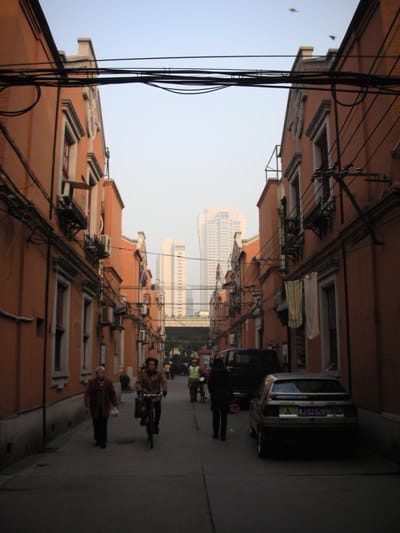Leslie’s Global Career Story
In 2015 I wrote this as a series of posts for Cate Brubaker’s blog, Small Planet Studio. After reading Cate’s series about her global career path, I decided to share my own long and winding story.
I moved back to California about a year ago, having spent eight of the past ten years in China and Chile. My experiences in foreign countries have had an immeasurable impact on my life and how I see the world. I’ve also been continually challenged to define and redefine what I have to offer, in a wide range of industries and roles and places.
A GLOBAL UPBRINGING
My global life started before I was even born. My parents are travelers. Mom studied abroad in college in Germany. Dad studied abroad in high school in Brazil. “To be my partner in adventure” was one of their wedding vows. (And it’s now the name of their blog.)
When I was a tiny, talkative girl growing up in San Francisco, Nana Petra took care of me while my parents were at work. A skilled cook and devoted grandmother from Mexico City, Nana Petra spoke Spanish as she dressed me up in white lace dresses and challenged me to games of Lotería.

Nana Petra and me. Circa 1987 or so. Photo courtesy of Ed Forman,
I studied Spanish all through high school and college, and jumped at the opportunity to study abroad as part of my studies at the University of California, Berkeley. I chose Santiago, Chile for a full year — half of my junior year and half of my senior year.
The history, business, and mountaineering classes I took all counted towards my Latin American Studies degree, and the conversations challenged my ideas about politics and social class structures.
That year I did an internship with an organization called Acción Emprendedora, a non-profit that supports entrepreneurs in their early-stage ventures. We worked with shopkeepers, toymakers and pastry chefs. Seeing the ways that entrepreneurship and business could be used to make a difference in people’s lives inspired me.
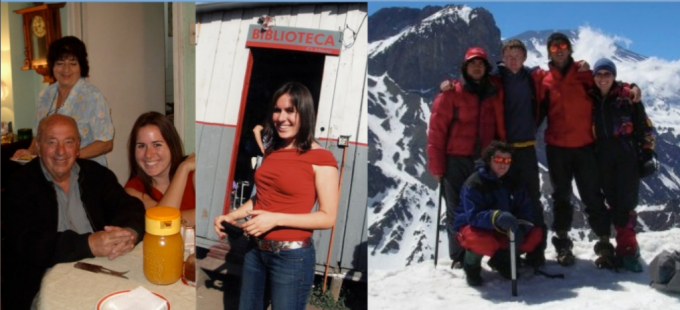
These pictures are from my year abroad. On the left I’m with my host mother, Latife, and her husband Jaime. In the middle I’m standing in front of the library in the Toma de Peñalolen, where I volunteered. On the right, I’m with my montañismo classmates at the top of a snowy mountain we climbed together.
At the end of 2005, I finished my year studying abroad. Chile changed my perspective; I’d grown up. As I packed my suitcases, I tried summarize my experience in one sentence: “Chile’s a country of contrast between rich and poor, traditional and modern, liberal and conservative, city and countryside and as an international student, I was able to see the extremes of all of these different contrasts often in the same day.” In December I left Chilean summer and landed in California winter.
RE-ENTRY HIT ME HARDEST WHEN I WENT BACK TO UNIVERSITY.
I lived in the sorority house where I’d lived B.C. (before Chile). The rules seemed silly — no boys upstairs after ten or downstairs past midnight, you must wear light-but-bright-blue + bronze + brown tweed for tomorrow’s event….
I overcommitted myself. I needed two classes to graduate, but signed up for five, including a social entrepreneurship seminar and a student-taught women’s leadership course.
About a month into the semester, burnout hit me. I missed Chile. I rushed between classes and activities and internships, fueled by fear of missing out, exhausted.
Fast-forward a few months. I graduated on May 18, 2006 — right on schedule. I marched in cap and gown to celebrate.
I HAD NO IDEA WHAT TO DO NEXT.

Update, more than 10 years later: I spotted a copy of this book in the sidewalk bin outside a San Francisco bookstore. Of course I brought it home. It didn’t resonate quite as much with 30-something Leslie, firmly living in the “real world” … but 30-something Leslie admired 22-year-old Leslie’s bravery and wanderlust! And felt nostalgic for those days. And sent an email to my friend Colleen, who I’d met in Beijing a few years after her book inspired me to move to China in the first place.
A few days later, I sat in my childhood home in the suburbs, as rain poured outside, reading a book called Delaying the Real World by Colleen Kinder.
This book contains hundreds of ideas of what to do after college. Go work on a cruise ship! Or teach at a ski resort! Or join the Peace Corps! It all sounded more exciting than going straight to graduate school or getting a job in a cubicle.Given my nostalgia for Chile and my interest in all things international, I started looking up everything in the international section.
I found out that the Council on International Education Exchange (CIEE) had a program called Teach in China, and they were looking for native English speakers with college degrees. I met those requirements. The deadline was a few days away. I’d never been to China, never taken any classes about China, never studied Chinese. I’d always focused on Latin America.
But I was curious. I wanted to be the kind of person who could pack up my life and move across the world into the unknown. So I called the CIEE office.
“Great!” the representative said. “Let me send you the list of program veterans.”
I sent a few quick emails and within a few hours, my inbox filled with encouraging notes:
Go Leslie, do this thing and you won’t regret it.
Do it! I got so much out of the experience. Much more than the study abroad programs that I did in college.
I love love LOVED teaching in China. I had virtually no teaching experience and spoke no Mandarin beyond ni hao and xie xie.
My students were beyond LOVELY and eager and enthusiastic.
The day before the deadline, I stood at Kinko’s, getting ready to FedEx in my documents to teach at Jiaxing University in Zhejiang Province, near Shanghai. I stood in the store, speechless and staring at my passport for a solid hour, asking myself: What am I doing? What am I doing? What am I doing?
LESS THAN THREE MONTHS LATER, I WAS ON A PLANE TO CHINA.
In August 2006 I landed at Jiaxing University in a “small town” of about a million people near Shanghai. The university gave me an air-conditioned apartment in an avocado-colored concrete walk-up building on campus.
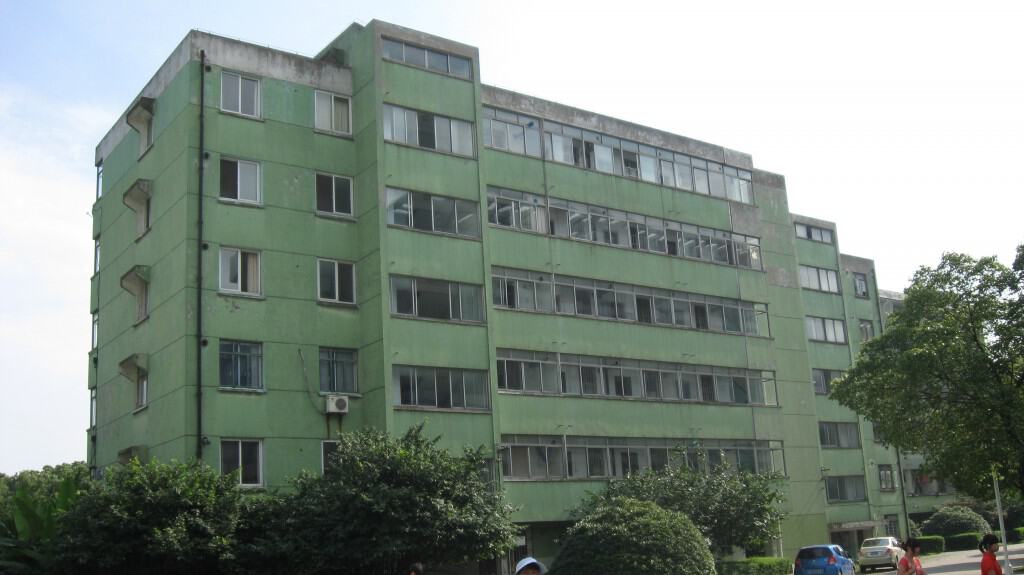
This experience was completely different than my travels in Latin America.
People stared at me and sometimes even took my picture. I quickly learned the most common questions — Where are you from? What’s your name? What do you do? Are you married? How much for this? — and simple answers. That gave me enough basic vocabulary to get around Jiaxing. I’d go to the vegetable market and the ladies would quiz me: “What’s that?” “Tomato.” “What’s that?” and so on, through all the fruits, vegetables, types of bread, and clothing and so much more.
AS I PRACTICED THE BASICS OF MANDARIN, I TAUGHT ORAL ENGLISH CLASSES.

I had 16 sections with 20-40 students each, many shy and unfamiliar with being asked open-ended questions. For one lesson, I brought in a collection of random products and toys for my students to advertise, including rubber duckies, a pink toilet plunger, a wooden back massage hammer, and a clay whistle in the shape of a chicken.
I instructed each group to name the product, think of four or more unconventional uses for it, imagine its target customers, and put together a creative presentation. Several groups impressed me with their creativity. The duckies became trusted confidants, the pink plunger became a hat for toddlers to wear so their mothers wouldn’t lose sight of them in public places, and the back massager became a self-defense weapon for elderly ladies.
I couldn’t help but laugh when one group advertised the chicken-shaped clay whistle. A shy boy explained, “This is small cock” (a word undoubtedly chosen with the help of an electronic dictionary). “Little boys think it is very interesting to play with. They play with it all day. Little girls think it is a bit boring….” Ah, I could not stop laughing….
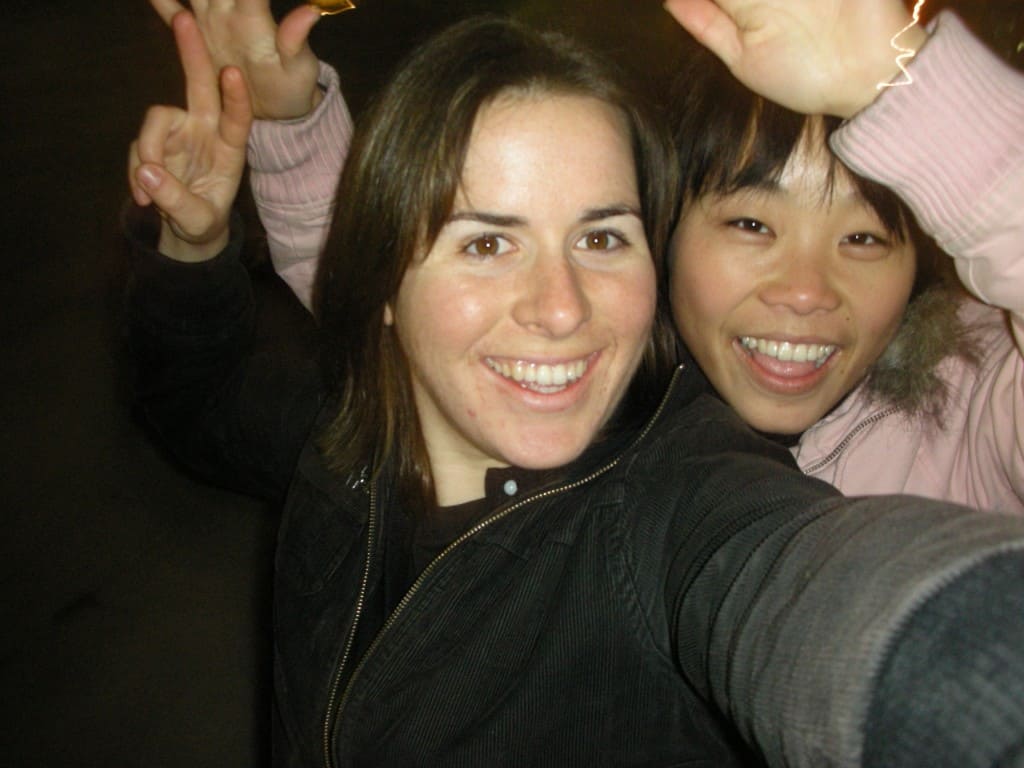
When the school year came to a close, I was ready to for a new challenge, but I wanted to stay in China. I found an internship at the American Chamber of Commerce in Shanghai.
During this six-month internship, I met representatives from multinational companies like Citibank, Disney and Nike and learned a lot about corporate social responsibility, social enterprise and the possibilities to do good through business. I worked with Christy Campbell, who wrote about her intern experience in China here.
At the end of 2007, about a year and a half after I’d landed in China, my internship ended, my lease ended, my visa expired, and I had a one-way ticket home to San Francisco just before Christmas.
Most people didn’t want to hear more than a sentence or so about China, so I kept my responses concise: “Fun. Interesting. Lots of people.” And then we’d move on to another topic.
Reverse culture shock hit me hard. I’d say things like, “Wow, there’s free coffee at Bank of America, and you can understand exactly what I need and help me in five minutes!? I fully expected to be here all afternoon” and “Wow, Trader Joe’s has so many choices. And I can read all the labels!”
I WAS BACK IN MY OLD LIFE BUT EVERYTHING FELT STRANGE AND OVERWHELMING.
I needed to create a new life rather than settling into my past. I traveled around the US and visited friends and family, and tried to reacquaint a little bit. I soon found a new job at a startup and moved into a new place with people that I’d met on Craigslist.
I began to treat my hometown as its own adventure. This attitude helped me move forward.
A few months later, the financial crisis hit, the San Francisco startup went under, and I became a full-time volunteer with a nonprofit focused on China. Since it brought together my interests in social enterprise, China and nonprofit marketing, it felt like the logical thing to do.
When the organization’s founder invited me to become its first paid Marketing Director in China, I jumped at the opportunity.
I PACKED UP MY LIFE IN SAN FRANCISCO AND MOVED TO BEIJING.
On a Beijing hutong — a tiny alley of small shops — our office was located in a old courtyard house. I wrote blog posts, created marketing plans, and made templates that people across the US could use to organize events to support this bootstrapped organization.
I moved into a big apartment that I jokingly referred to as “The Real World: Beijing.” Two brothers — Syrian-Swedish bodybuilders — were on the lease and they rented out the other bedrooms. We shared the space with a French renewable energy engineer, a Bulgarian preschool teacher, a belly dancer from Kazakhstan, a journalist from Washington D.C., a Chinese woman who spoke flawless English following years in New Zealand and South Africa, and many, many more — everyone stayed just a few months.
In Beijing I learned that it’s hard to become a paid employee doing what you’d previously been doing as an unpaid volunteer. Your role needs to become much more valuable. In a startup nonprofit with a tight budget, salaries can be hard to justify.
THAT’S HOW, JUST TWO MONTHS AFTER ARRIVING IN BEIJING, I NO LONGER HAD A JOB.
But I did have a visa. And the financial crisis was in full force in the US. So I decided to stay.
At dinner with friends, including one I’d taught with in Jiaxing, I explained all of this. That friend was dating a British guy who was a co-founder of a corporate training firm based in Beijing.
A couple of days later, he called me and said, “I hear you’re a good teacher. We have a client who needs an enthusiastic American. It’s a patent law firm. Come in tomorrow for a meeting.”
He hired me to join his team.
I SETTLED INTO A SCHEDULE THAT WAS EQUAL PARTS INSPIRING AND EDUCATIONAL.
In the mornings I’d meet with my Chinese tutor Layla to study vocabulary, pronunciation and grammar. Thanks to her patient guidance, I graduated from toddler-speak (I want that! Give me two bananas!) to the level of a nerdy but illiterate 8-year-old with an unusual command of environmental jargon. Layla was so patient with my questions about specific terms like “wind turbine” and “garbage incinerator.”
In the afternoons, I led one-on-one specialized English classes for patent attorneys, wind energy engineers, reporters from an international energy publication, and the ambassador from the Republic of the Congo to China. Conversations with clients challenged my ideas about creativity, success, and so much more.
This rhythm continued for about a year. Next, I enrolled in more intensive Chinese classes.
Around that time, at a farewell party, I met an American musician who spoke flawless Chinese. We exchanged business cards. A few months later over g-chat he mentioned that the ad agency where he worked was looking for a copywriter. Was I interested in writing ads?
I thought it sounded interesting enough and was hired to start a few weeks later.
I STEPPED FEET FIRST INTO THE CORPORATE WORLD.
This crash course in advertising was 80% in Mandarin, packed with biz jargon in English. I enjoyed the challenge of describing product features in succinct, easy-to-translate headlines.
Our client was one of China’s biggest brands. My job was to write ads in English about new products for export, to be translated into Russian, Thai and a bunch of other languages.
My experience was far from smooth. As a member of the creative team, I worked with designers and was expected to stay as long as it took to get the job done. We’d sit in the office all day with nothing to do, and then — at 9pm — have an urgent meeting about deliverables for the next morning.
This required me to figure out new ways to communicate. I remember drafting a headline in the middle of the night — a play on the word “edge” — and needing to explain it to my manager, who spoke zero English. My Mandarin was nowhere near thesaurus level. To capture the sense of edgy / cutting-edge / competitive edge, I’d experiment with combinations of online tools like Wordnik and Google Translate.
Every other day, at an undetermined point between 4 and 7am, we staggered out of the office. The wind howled through my too-thin clothes, and we stood for too long on the ring road, waiting for a cab. Exhausted, I took bureaucratic hassles too personally. I failed to stand up for myself. It hurt.
Around the same time, a good friend got sick with a not-yet-diagnosed but scary illness (he’s fine now, but his treatment lasted more than a year).
THIS GOT ME THINKING: IS THIS WHAT I WANT TO BE DOING?
I knew in my gut: the answer was no. I was miserable and unwell. I didn’t like being a tiny part of a multinational machine. I craved something new.
The day before the company finalized my work visa, I quit.
I searched for a new way to experience Beijing. With plenty of freelance work — tutoring a sweet UK-bound high school student, training an upstart recruitment firm, planning a charity cycling event — I made ends meet, but felt overwhelmingly reactive and uninspired.
I spent too many days alone in my apartment, clicking mindlessly through personal blogs of people I didn’t know. Slept in too late. Waited for the phone to ring.
Then suddenly, in March 2011, my must-move-on itch began to materialize into a workable plan. I received an unexpected but ultimately life-changing email from a Canadian-American renewable energy entrepreneur whom I’d met in Chile (on the sidewalk, in the rain, when I shared my umbrella with her and her dog) while I was studying there in 2005. More on that in the next installment of this series!
AS I LOOK BACK ON FOUR YEARS IN CHINA, HERE ARE THE BIGGEST LESSONS I’VE TAKEN AWAY FROM IT ALL:
- You can reinvent yourself. At age 22, I went from being a student of Latin America to a teacher in China in three months, with no specialized training. Whenever I feel overwhelmed by major change, I remind myself that I’ve done this before and I can do it again.
- When you live and work abroad, learning the language makes it much easier to make local friends and feel like part of the community. But language skills are not enough to really build a career.
- The best opportunities come through friends and friends of friends.
- When your work life is in flux, it’s really important to find stability in other ways. Figure out what makes you happy outside of work — making brunch with friends? yoga? exploring new parts of the city? — and make these things a priority in your daily life.
IN 2011, I LEFT CHINA AND MOVED TO CHILE.
I’d studied abroad in Chile in college and the country had always held a special place in my heart. I’d stayed in touch with an entrepreneur I’d met randomly during my study abroad in 2005, and she invited me to join her solar energy startup team for their application to Start-Up Chile, a government-backed accelerator.
In July 2011, after a whirlwind of flights and visa applications, I landed in Chile. Our company’s Chilean business partner picked up my new colleague and me at the airport and delivered us to the home of our super-generous host.
At Start-Up Chile orientation, we joined entrepreneurs from countries like Brazil, Canada, Estonia, England and Portugal for an energetic introduction to the program.
Start-Up Chile was founded in 2010 by Chilean businessmen who’d lived in Silicon Valley. Entrepreneurship had long been an important component of Chile’s economy, but policymakers weren’t seeing as much growth as they’d hoped.
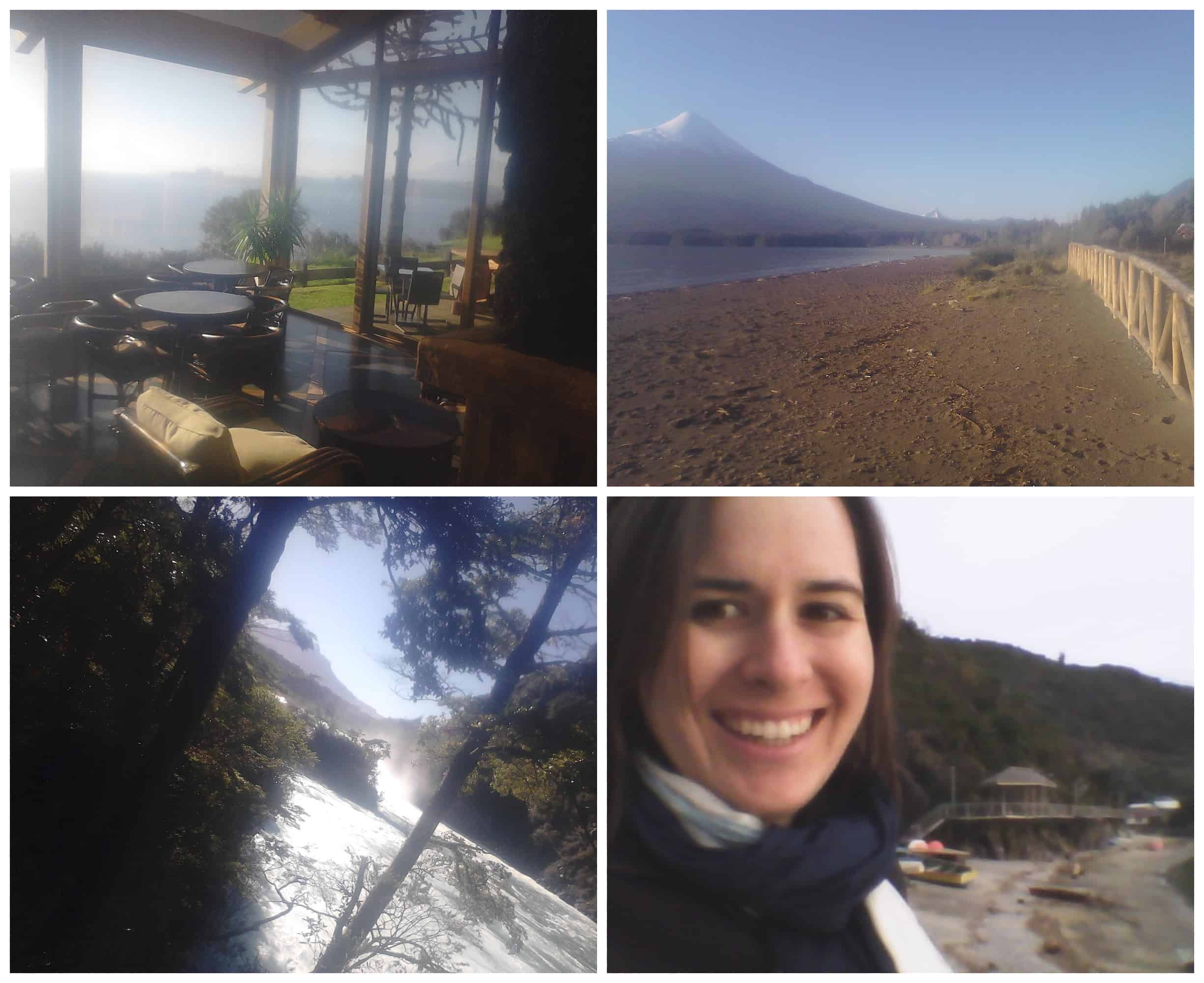
Academic research studies pinpointed a key problem: fear of failure was preventing would-be entrepreneurs from embarking on ambitious ventures. This fear stemmed from both legal and cultural conditions.
Alongside substantial changes in Chile’s business laws, the Ministry of Economy created Start-Up Chile to introduce entrepreneurship to Chile and Chile to the entrepreneurs of the world.
Each team received a budget of approximately $40,000, logistical support, access to a beautiful office, and so much more.
Start-Up Chile provided connections with leaders in Chile’s business community, which gave us access to partnership opportunities and cultural quirks. For example, we met with Chile’s biggest mining company to discuss solar energy projects and the office was decorated with pink balloons — it was some sort of spirit week competiton and the department had a Pink Panther theme!
THROUGH THIS COMMUNITY, I SOON GOT INVOLVED IN A BUNCH OF OTHER PROJECTS.
These included translating a 42-page report about power lines from Spanish to English for an engineering firm and speaking to audiences all over Chile about startups, China and Silicon Valley. I even served as a Chinese-Spanish interpreter for mining investors.
As we finished our six-month term in Start-Up Chile, I wrapped up my work with the startup and moved in with my Chilean boyfriend.
These arrangements gave me the opportunity to experiment with a patchwork paycheck of teaching, public speaking, early-stage entrepreneurial projects and more.
I joined Co-Work, a collaborative office where I sat alongside entrepreneurs and local representatives of regional businesses. At a happy hour, I mentioned my latest idea: English classes focused on practical skills like pitching your startup to investors. The crowd loved the idea and asked: How much? How do I sign up?
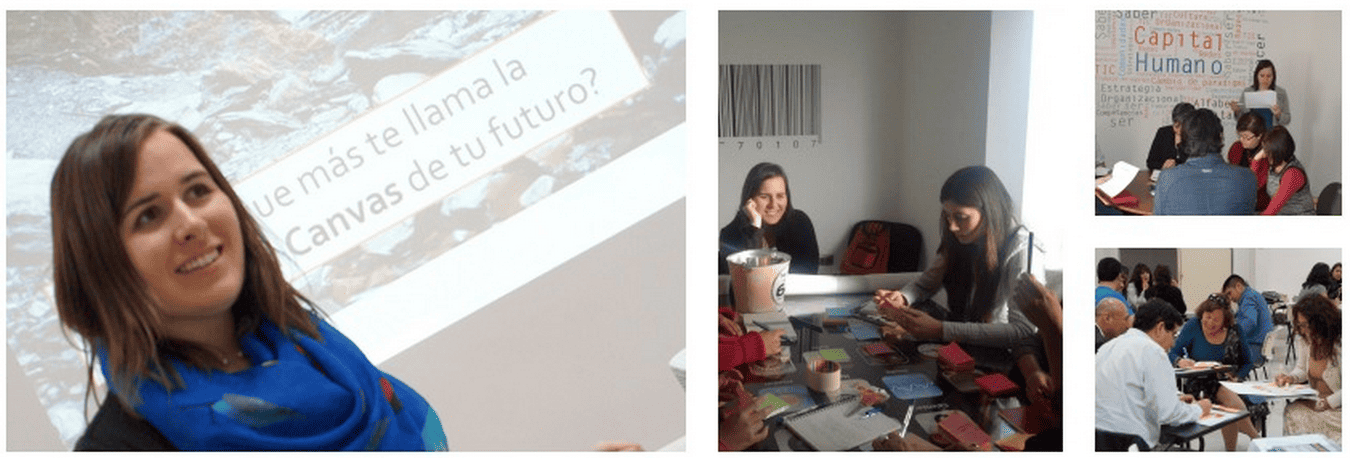
Before I had time to start building out that idea, one of the founders of Co-Work forwarded an email from the Universidad del Desarrollo, a request to create and teach a new class in English about a niche area of entrepreneurship. Of course I was thrilled to hear this and scheduled an interview for the very next day.
I pitched the concept of an elective course about social entrepreneurship. My last semester at Berkeley I’d taken a class just like this and used it as the basis for the new curriculum. My class had about 30 students, half of whom were Chilean undergraduate business students and the other half exchange students from Europe. At the same time, I enrolled in a nights-and-weekends course in the design school of Chile’s top university, a diploma in creativity and innovation. I loved the class and made great friends.
Soon I had four part-time jobs and was in school and had trouble renewing my visa (visa bureaucracy is like a psychological tax on living and working abroad — not fun, anywhere) and all of that added up to a nasty stress-induced case of bronchitis. Yay, medicine.
As I gained more experience and figured out what resonated with my students, it got easier. I taught my social entrepreneurship class twice to two different groups. I added another class — one of the university’s core entrepreneurship courses, taught in Spanish — and eventually began teaching e-commerce courses at a second university as well. In collaboration with clients in Iquique, in the far north of Chile, I led a series of government-funded entrepreneurship workshops, including one where my parents flew in from Ghana to speak about Silicon Valley.
I’d been juggling all of these projects for about two years when the all-of-the-above approach went from being energizing to unpalatable.
Surrounded by entrepreneurs, I felt pressure to turn everything I’d been doing into a real company of its own. With a talented team of Chilean designers, I obsessed about transforming my personal blog into a bilingual consultancy. For months I wrote and rewrote in English and Spanish, describing what this company could offer—Interactive Workshops, Collaborative Translation, Dynamic Presentations—and showing it to everyone who would listen, begging for advice and validation.
The designs and redesigns felt wrong, mostly because I was trying to communicate too many things to too many types of people.
And none of those truly reflected what I really wanted to do, what was really keeping me up at night.
THOSE MIDDLE-OF-THE-NIGHT VOICES USUALLY SAID THE SAME THING: ME QUIERO IR. I WANT TO LEAVE.
This desire started off vague and then I began to research options to make it real. More on that in the next installment.
As I look back on three years working in Chile, here are the biggest lessons I’ve taken away from it all:
- It’s incredibly helpful to be part of an established program (like Start-Up Chile) that can help you land and get settled in a foreign country.
- One of the best decisions I made was to enroll in the design course. I was already fluent in Spanish, but learning about an entirely new topic helped me to take my language skills to the next level. I also met many great friends in this class.
- Everyone seems to have advice! And it’s important to be able to filter through it all and make your own decisions. Making radical international moves can be stressful and disorienting, and you’ll always be figuring things out as you go along.
IN JULY 2014, I PACKED UP MY LIFE IN CHILE AND MOVED BACK TO MY HOMETOWN, SAN FRANCISCO.
I’d been teaching entrepreneurship classes at universities in Chile from a design thinking and user experience perspective, and had been reading lots of books in English on these topics and paraphrasing them for my students in Spanish… but I really wanted to learn more.
I enrolled in General Assembly’s User Experience Design Immersive, a 10-week intensive course that teaches the whole process of designing technology products that are simple, intuitive and easy to use. Here’s a note I wrote to myself during our orientation and a picture from the first day of class. I’m in the back in short sleeves.
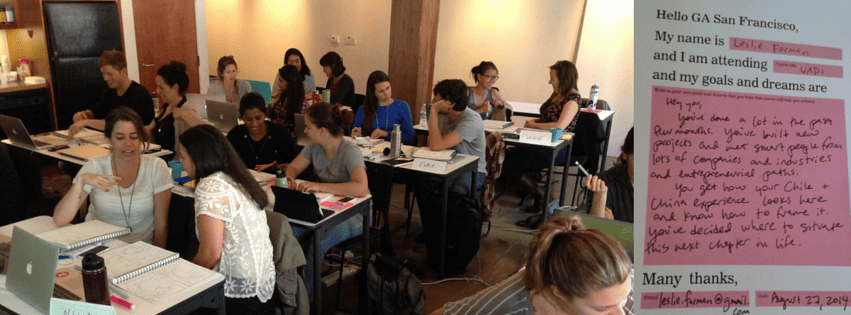
My classmate and I did our final class project for an early-stage startup that makes health and safety solutions for mining companies. A few months later, that company hired me to lead product design and brand communications. I even got to travel to Peru and Chile to meet with partners and potential clients. But the job wasn’t the best fit and once my main project launched, I moved on.
WITH LOTS OF TIME ON MY HANDS, I FELT SUPER MOTIVATED TO WRITE.
For years I’d been talking about writing a book about international career opportunities. I got on Skype with friends of friends and we chatted about international career paths. I met with an editor. I joined a Startup Weekend event about immigration and innovation, where I got more feedback on the concept and turned it into a pitch deck.
But after a few weeks my enthusiasm faded. I spent too much time alone, clicking through the internet. I’m an extrovert by nature and when I spend too much time alone I get depressed. The book didn’t write itself (that shouldn’t come as a surprise to anyone!)
This summer (it’s still summer in San Francisco as I write this in late September 2015… Indian Summer) has been full of family events—mostly happy ones—and it’s nice to be in the same city as my immediate family, especially after so many years away.
BUT CAREER-WISE, IT’S BEEN HARD.
I’ve been applying for jobs and seeing that most recruiters here don’t really care about my diverse international experience. I’ve spent hours editing my resume and cover letters and attending all kinds of events. I’ve felt frustrated, disconnected and uninspired.
I know I’m not alone in this re-entry career malaise. Nina Mufleh, who moved to Silicon Valley after ten years in the Middle East, shared her story in this fabulous article for the Harvard Business Review: What a Year of Job Rejections Taught Me About Pitching Myself.
My story began in May 2014 when after 10 years of building a successful career in the Middle East, I decided to move to Silicon Valley to look for opportunities with tech companies. I wanted to learn, and to be part of something big. I knew it would be a challenge to restart my career in a new market, especially one that is densely populated with talent, so I expected the process to take a few months.
As a few months turned into a year and I saw no signs of progress, I reached a point of panic. Something felt wrong. Something was wrong. How was no one interested in learning more about my background? How could a career that ranged from working with royalty to Fortune 500 brands and startups not pique the curiosity of any hiring managers?

Nina eventually reframed her situation by approaching it as a marketing challenge and creating nina4airbnb. She analyzed the whole experience in a detailed white paper and a behind-the-scenes blog post and concluded: “Rather than focus on why I’d fit into a top organization, I should have been telling them how I’d stand out.”
Though I haven’t put together such a bold campaign, I’ve made the effort to stand out rather than fit in. I’m making progress in the search, especially with companies that need my Spanish language skills. I can’t share all the details yet, but things are definitely looking up.
THANK YOU FOR READING MY STORY.
I’ve enjoyed sharing my career path with the Small Planet Studio community. In four posts I’ve touched on 10+ years of moves and shifts and changes, so of course I haven’t had space to include all the details. If you have questions or would like to connect, please feel free to email me directly: leslieforman [at] gmail [dot] com.
Here’s to all of our global careers!
Note: I last updated this page in mid-2015. A lot has happened since then…. Here’s what I’ve been up to more recently.

